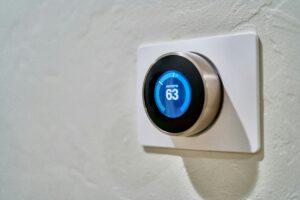Maybe it happens every time you use a hairdryer, leave the iron on, or plug in one more string of Christmas lights into an overfilled electrical octopus. But when a circuit breaker gets tripped, it brings everything to a screeching stop. Hopefully, it’s just a matter of opening the electrical panel door and resetting the breaker.
If this happens every time you want to use a curling iron though, it’s a sign that something is wrong with your appliance, the outlet, or your electrical system as a whole. There’s a reason hair dryers have their own “trip” circuit if you will. Homes with older wiring may not be able to handle the short, incredibly strong blasts of power these appliances need.
It’s also why bathrooms, kitchens, and other areas that are near water are required to have GFCI (Ground-Fault Circuit Interrupter) outlets. These outlets sense when a ground fault, or any deviation from the norm, occurs and cuts the power to the outlet. This can save the outlet, the appliance, and even the circuit breaker in the panel.
Reasons a circuit breaker keeps tripping
Outside of morning rituals, there are any number of reasons a circuit breaker can trip. In some cases, there’s nothing more to worry about than unplugging a few appliances. At the other end of the spectrum, it could mean you need a whole new electrical panel. Here are a few examples of what could be tripping a circuit breaker.
Overloaded Circuit
A circuit is overloaded when the amount of power it’s providing can’t account for the amount of power trying to be drawn from it. If a certain appliance needs 15 amps to operate but it’s trying to flow through the circuit that’s 10 amps, it will shut off.
This could be caused by any number of issues. Using a mixer and a blender at the same time on the same outlet, a power surge caused by a faulty appliance, or some other kind of malfunction. If the circuit didn’t get tripped and the appliances continued to draw power, it could overheat the circuit wiring, melt the plastic sheathing, or cause an electrical fire.
Short Circuit in Wiring
There is an incredible amount of power coursing through the walls in your home. Luckily, modern wiring is well-equipped to handle these paths by keeping the flow of electricity well-insulated from one another. However, if the sheathing around these wires is disrupted, it could cause a short circuit.
In most cases, the wiring in our homes is well protected. But if it does get damaged as a result of home improvement jobs, it could cause a fire when the electricity tries to take a different path than intended. That goes for any wiring outside of the walls, too. If a family pet chews through the wire from a lamp or other fixture for example.
Ground Fault Issue
There are three electrical wires in play with most homes: Hot, neutral, and ground wires. A short circuit happens when the hot and neutral wires somehow cross. A ground fault occurs when the hot wire comes into contact with the ground wire or other grounded material, such as a junction box or even water (bathrooms, kitchens, or other moist areas).
Short Circuit in an Appliance
Sometimes a circuit can be tripped and it has nothing to do with the home’s electrical system. The same hot, neutral, and ground wires can be found in your appliances no matter how small. If there’s a break in the circuit anywhere along the line (including the appliance) the circuit can be tripped to cut off electrical power to that line.
Bad Electrical Panel
Many short circuits or ground faults can happen from inside the panel if there are loose connections due to poor installation or just working themselves free through the expansion and contraction. Just like anything else, the panel and breakers can also wear down over time and need replacement. In some cases, too many electrical circuits have been added to a panel.
Or it could be a matter of a circuit breaker that is mislabeled or misplaced. A dryer needs a large amount of power (30 amp) to dry your clothes. But if it’s been hooked up to a smaller breaker, it’ll never work and will cause a lot of damage to the panel.
If your circuit breakers keep tripping, it’s time to call Prairie Electric to investigate the issues and make any necessary electrical repairs. It could be a matter of installing GFCI outlets or changing a break or two or replacing the panel altogether.
Depending on the age of the home, we can also perform whole-home rewiring. If your home is using a fuse box retrofitted to handle new wiring, you should have it inspected immediately to protect your family and your home. Please reach out to Prairie Electric if your circuit breaker keeps tripping or you have any other questions about the wiring in your home.


